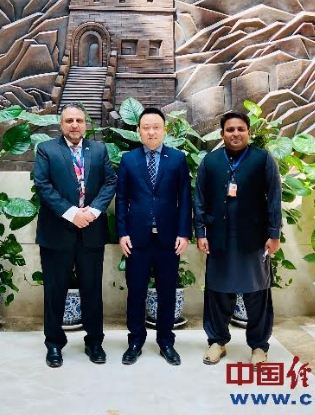DNA
BEIJING, July 2: “The agricultural cooperation under China-Pakistan Economic Corridor (CPEC) has three main goals. First, to help Pakistan improve agricultural research sustainability.
Second, according to a China Economic Net’s report to promote the development of Pakistan’s export-oriented economy.
Third, to introduce more advanced agricultural production factors into Pakistan,” said Dr. Gu Wenliang, Agricultural Commissioner at the Chinese Embassy in Pakistan, on what is happening in the agricultural sector under CPEC to further boost China-Pakistan cooperation in a webinar themed by “COVID-19 and Higher Education:
Addressing about food Security through Policy Support and Research”, he said “Pakistan’s economy is basically export-oriented and the majority of the exports are agricultural products. We’d like to promote value-added processing to help more Pakistani products up to the international standards, entering more markets globally.
Now, rice, mango, citrus, dry nuts, honey and seafood, etc. from Pakistan are being exported to China. Besides, it’s learned from Dr. Gu in the webinar that next year Pakistani onion has the chance to enter the Chinese market as the two governments are dedicated to signing more protocols to let more Pakistani products like cherry, potato, etc. be exported to China.
“I always think that Pakistan’s meat products have the greatest potential to be exported to the Chinese market because China is importing numerous meat products from all over the world, and the livestock sector in Pakistan is producing a lot of meat products,” Dr. Gu said.
However, due to the food and mouth disease, Pakistan’s meat products currently haven’t got permission to be exported to China. “We’re trying to build free zones to encourage more Chinese enterprises to invest in building cold storage, cold logistics and food processing to let Pakistani products enter China,” Dr. Gu added.
According to Dr. Gu, the two governments are negotiating about an memorandum of understating (MOU) in animal disease control to help Pakistan improve the livestock sector as well as lift Pakistan’s export of meat products.
On January 26, 2021, under the coordination of the Chinese Embassy in Pakistan, China-Pakistan Agricultural and Industrial Cooperation Information Platform was launched by China Economic Net and China Machinery Engineering Corporation.
“On the platform, we’ve held three online webinars on seed industry, animal husbandry, fishery and agricultural product processing, etc. ”
To further boost Pakistan’s export to China, Dr. Gu suggests Pakistani traders think more about what the Chinese market needs most. “China is a vast country which also is producing lots of agricultural products itself. Let’s take mango for example.
Southern China abounds with mangoes. Therefore, Pakistani mango exporters may focus more on western areas of China like Xinjiang,” said him. “The Embassy is the bridge of sharing information from both countries to effectively and precisely enhance the bilateral cooperation, ” he said.
In the webinar, a Chinese technology named ‘maize-soybean strip intercropping technology’ attracted much interest and attention.
“In China, the population is increasing day by day while the land is decreasing constantly. So they decided to go for intercropping to grow two or more crops at the same time. Actually Pakistan is facing similar conditions with China.
The prospects for adopting intercropping in Pakistan is bright as well,” said Muhammad Ali Raza, post-doc at Sichuan Agricultural University.
“At present, Pakistan is importing about 1.7 to 1.9 million tonnes of soybeans from other countries. By using this technology which greatly improves use efficiency of land, water and radiation, we can reduce our imports by 76% via locally producing soybeans up to 0.9 to 1.3 million tonnes, without decreasing the production area of maize,” said Dr. Muhamamd Ali Raza.
“Notably soybean is three times the value of maize in the local market,” he added. Therefore, intercropping soybeans into current maize fields will create much more economic benefits for farmers as well as safeguard food security.
It may be mentioned here that on June 25, Prof. Athar Mahboob, Vice Chancellor of the Islamia University of Bahawalpur and Dr. Muhammad AliRazahad a meeting with Dr. Gu Wenliang at the Chinese Embassy in Pakistan. Possible future cooperation between the Islamia University of Bahawalpur and Chinese universities, especially inagriculture, engineering, and information technology were discussed.
“Now, maize-soybean strip intercropping technology project by Sichuan Agricultural University (SAU) and the Islamia University of Bahawalpur (IUB) has been included in the CPEC projects, which will ultimately increase the cereals and legumes production in Pakistan,” Dr. Muhammad Ali Raza told CEN.











